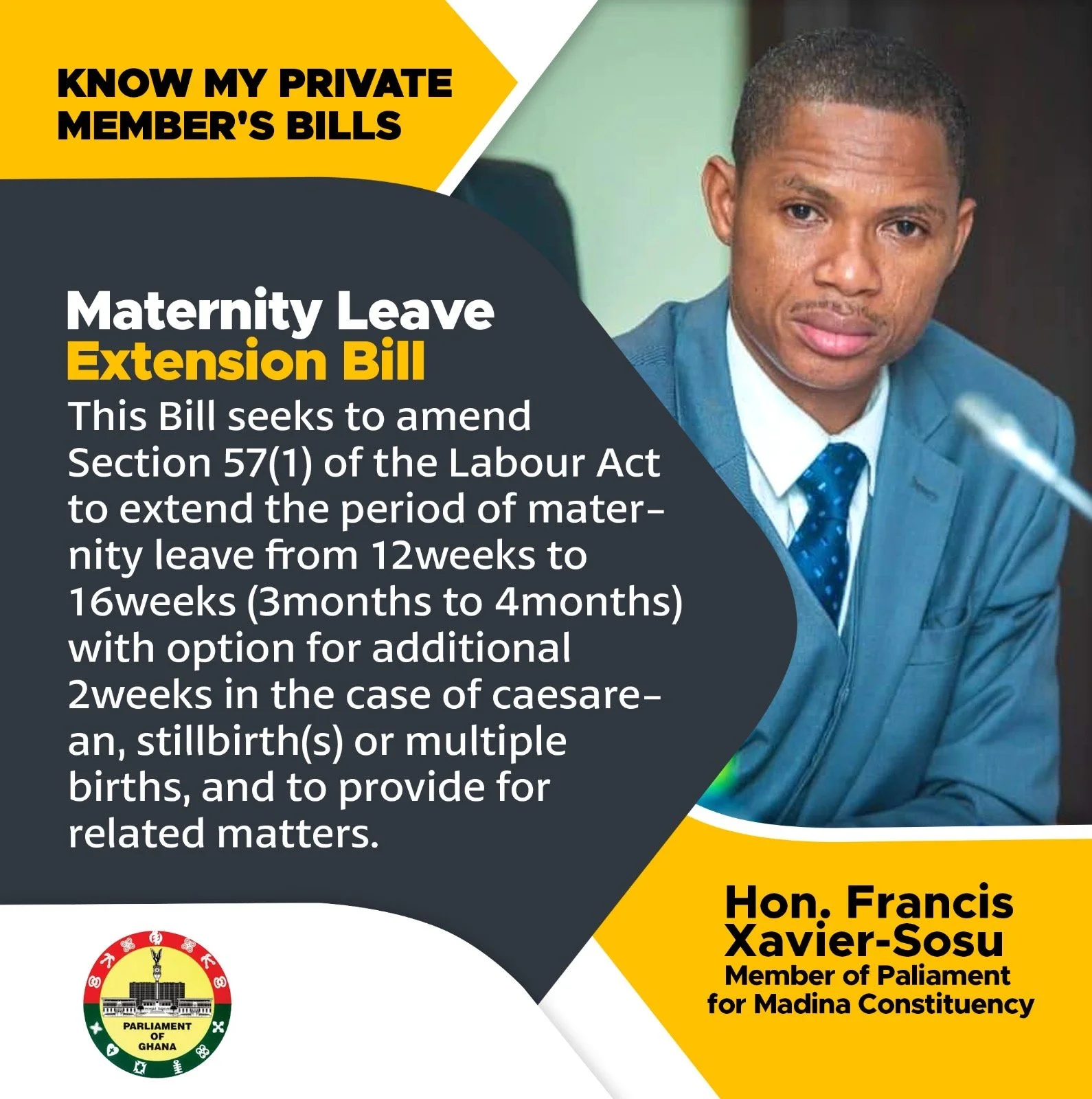Ghana’s Labour (Amendment) “Parental Leave for All” Bill
In October 2023, Ghana's Parliament received a Private Member’s bill aimed at revising the country's approach to parental leave. The bill, sponsored by the Member of Parliament for Madina, Hon. Francis-Xavier Sosu, seeks to make pivotal amendments to the Labour Act, 2003 (Act 651). This legislative initiative, known as the Labour (Amendment) Bill, 2023, or "Parental Leave for All” bill is set to enhance maternity and paternity leave in Ghana.
The core proposition of the bill is to extend the current maternity leave from three months to four months, recognizing the critical need for additional recovery and bonding time post-childbirth.
Beyond maternity leave, the bill introduces a groundbreaking move towards inclusive parental support by advocating for paid paternity leave. For the first time, fathers could be eligible for a minimum of seven days to a maximum of four weeks of leave, with provisions for an extra two weeks in cases mirroring those outlined for extended maternity leave.
Maternity Leave Amendments
The proposed amendment aims to extend maternity leave from 3 to 4 months, with an additional 2 weeks in cases of caesarean, stillbirth(s), or multiple births.
The rationale behind this proposal includes the recognition of the physical and emotional recovery needed after childbirth, especially in more complicated cases.
There is an acknowledgment of global standards and practices where maternity leave is more extensive, with examples cited from Canada, the UK, and various European countries, demonstrating a global perspective on maternity leave policies.
The amendment suggests that addressing the needs of women who experience loss during pregnancy or delivery is crucial for their well-being.
Paternity Leave Introduction
The introduction of paternity leave is proposed, with a minimum period of 7 days and a maximum of 4 weeks, allowing fathers to support their partners and bond with the newborn.
The proposal highlights the importance of paternity leave in gender equality and the shared responsibility of child-rearing.
Labour Act Specifics
The proposed amendments would specifically revise Sections 20 and 57(1) of the Labour Act 2003 (Act 651) to reflect the new leave periods.
The bill is framed in the context of improving maternal health outcomes and addressing the needs of families during the critical postnatal period.
Supporting Arguments
The bill is backed by data on maternal mortality rates and the recommendations from health organizations about the benefits of extended maternity leave.
The need for legal reform is also justified by the lack of current provisions for women who lose babies during pregnancy or delivery and for fathers who wish to support their partners.
A memorandum accompanying the proposed bill sheds light on the historical context and urgency of these amendments. It recounts that in November 1919, over a century ago, the first steps were taken to protect pregnant women at work with the adoption of the Maternity Protection Convention at the International Labour Conference, marking the first gender equality international labour standard. This convention recognized the crucial right to paid leave related to childbirth with employment protection, underscoring maternity protection as a primary concern of the International Labour Organization (ILO).
In Ghana, the stark reality is presented by the maternal mortality rate standing at 350 out of 100,000 live births as of August 2022, significantly higher than the World Health Organization's (WHO) standard. The majority of these deaths, as reported by the Greater Accra Regional Hospital (Ridge), result from bleeding during or after childbirth. This situation underscores the WHO's recommendation for extending maternity leave to six months to facilitate exclusive breastfeeding, a sentiment echoed by the Ghana Medical Association.
Furthermore, the existing legislation, Act 651, particularly section 57(3), provides for an additional two-week leave in specific cases but remains silent on the plight of women who lose their babies during pregnancy or delivery. This gap in the law highlights a pressing need for compassionate support for women during their most vulnerable times, emphasizing the physical and psychological toll of such losses.
Hon. Sosu's advocacy for extending maternity leave to 16 weeks, with additional provisions for paternity leave, aligns with global standards and the objective of advancing "Good Health and Well-Being" under SDG 3.
Stay tuned for more updates on this bill.
Update:
The draft of the Labour Amendment Bill, 2024, led by Hon. Francis-Xavier Sosu (Esq) and his team, has been finalized. The final draft bill now includes extending maternity leave from twelve to at least seventeen weeks, with a maximum of twenty-six weeks. Additionally, paternity leave will be introduced for the first time, providing men with a minimum of two weeks and a maximum of four weeks of leave, ensuring full remuneration and benefits during this time.
Furthermore, the draft bill incorporates flexible working conditions for pregnant or lactating women, allowing them to apply to their employers for adjustments. Employers will also be required to respond to such applications within 14 days.
The next step involves the gazette publication of the bill.


